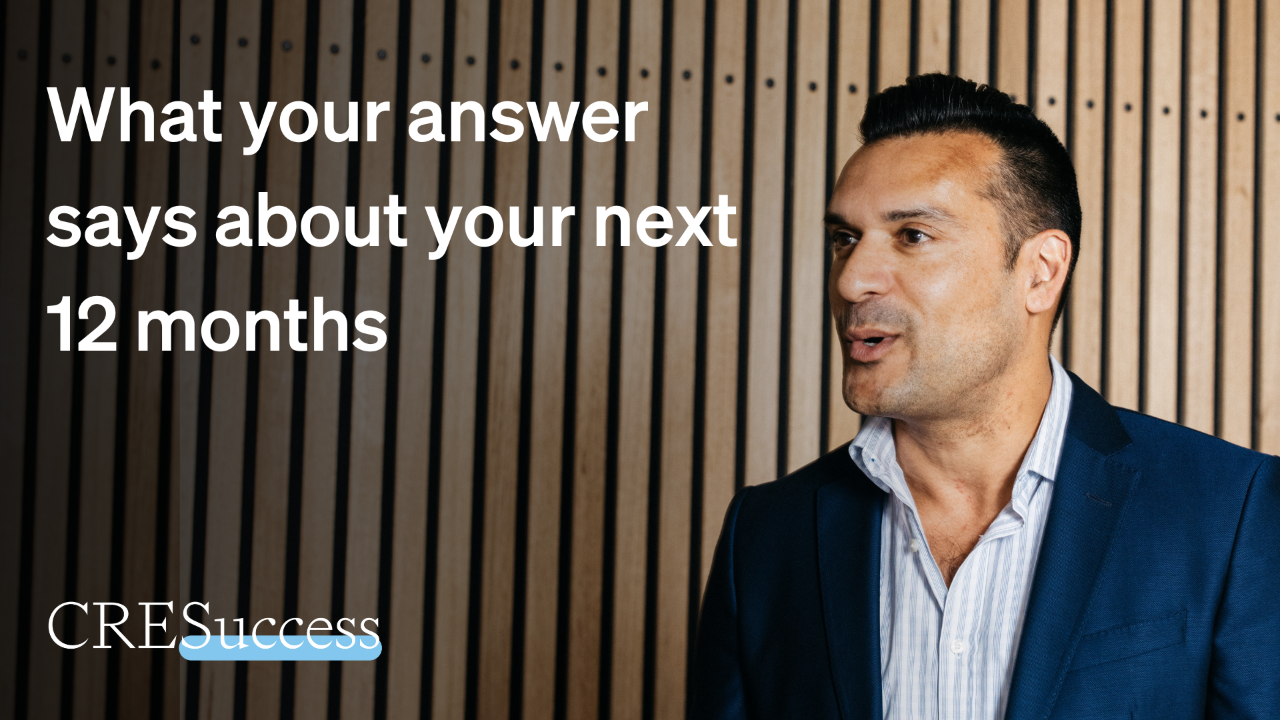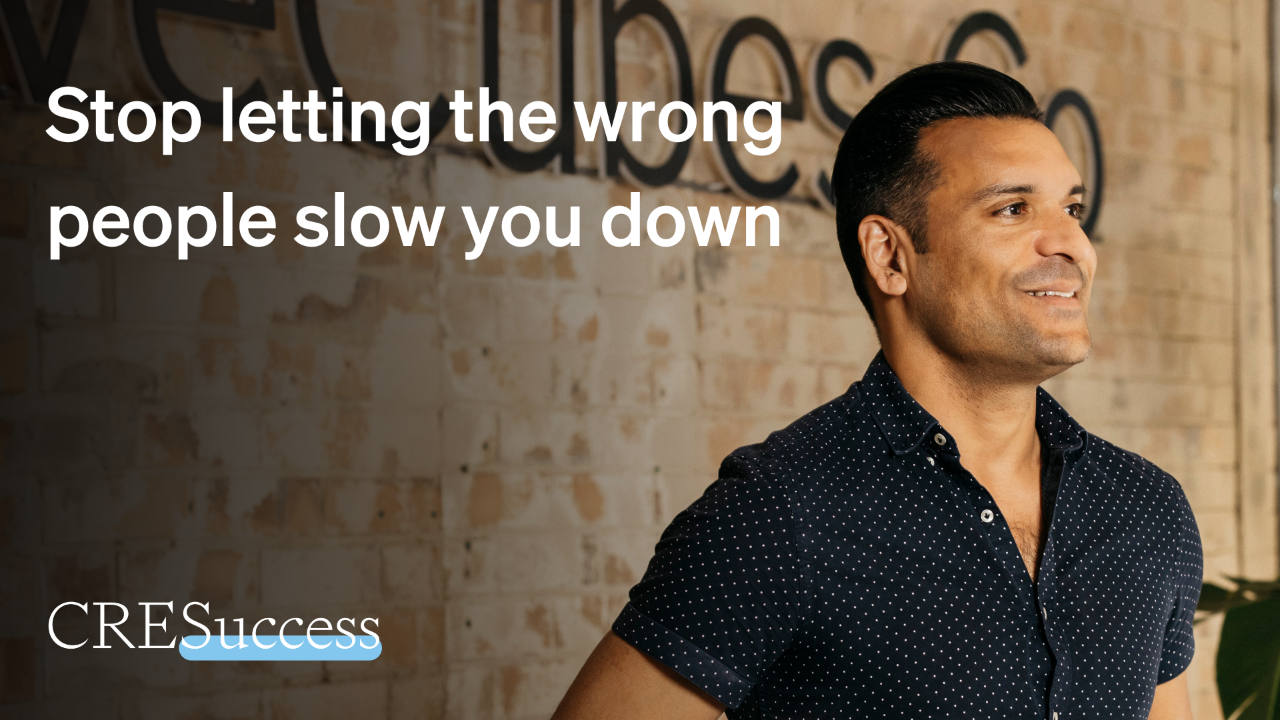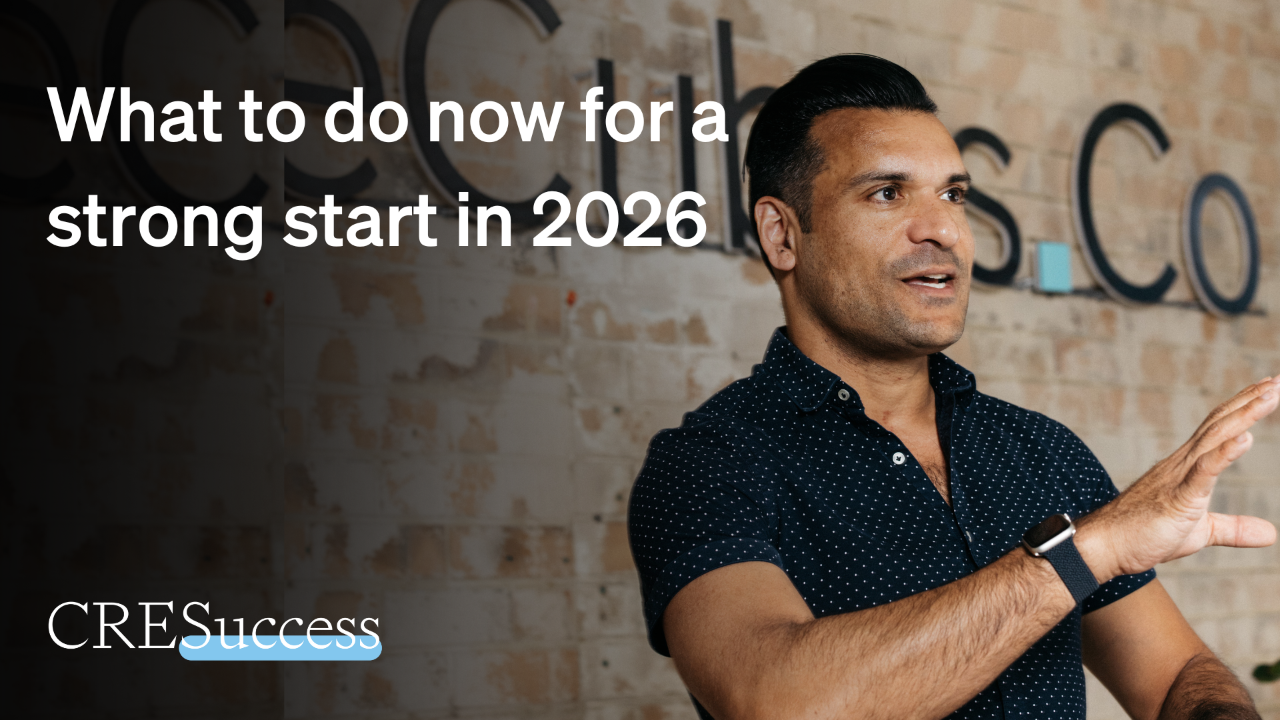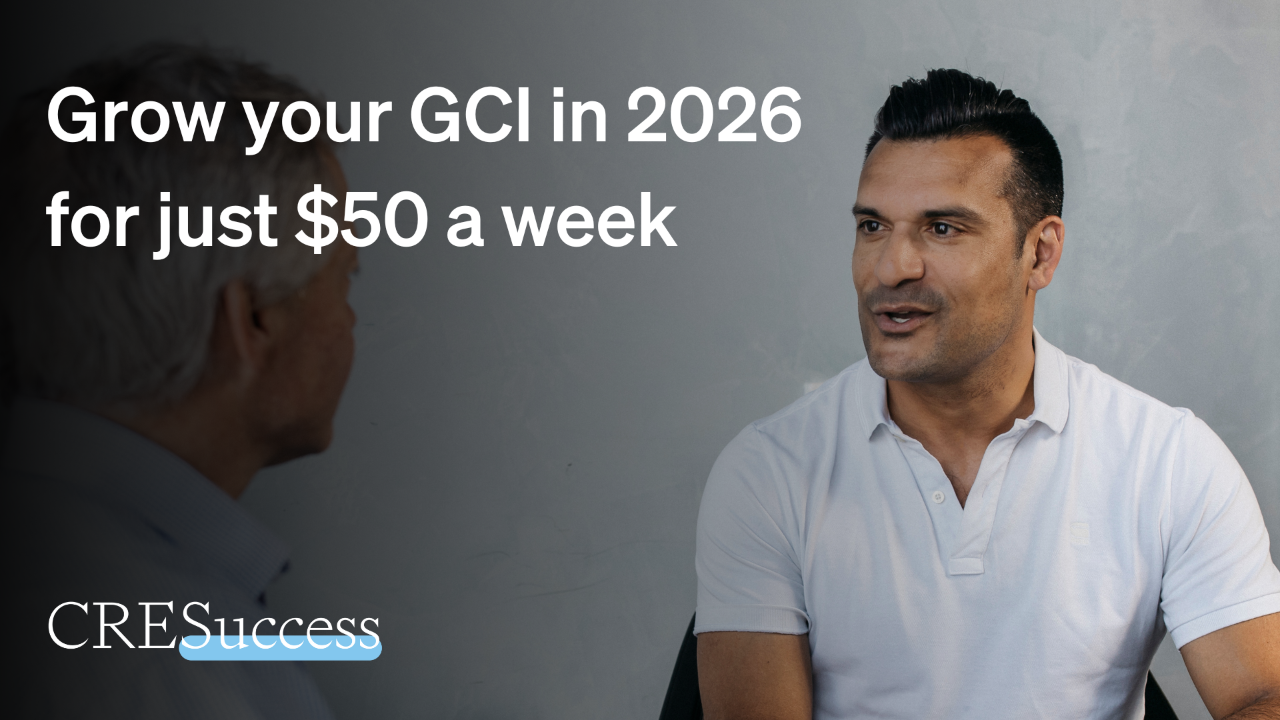How to get your team to spend more time on prospecting.
Mar 05, 2025
CRE Success Principle: You can make prospecting a habit by having structured, high-energy prospecting sprints, where you get real results that build your confidence, so you do it more.
A Prospecting Power Hour is where your team gets together and does nothing but proactive outbound prospecting for 60 minutes.
Setting one up is a straightforward but powerful way to get everyone engaged in focused, results-driven prospecting.
Even if it happens just once a week, this session will boost lead flow, helping you to increase your listing stock and then get more deals done.
Want to know how a power hour can work in your office? Join me for episode 210 of Commercial Real Estate Leadership where I lay it all out.
And, if you’d like to follow our Prospecting Power Hour Playbook, which shows you exactly how to structure each session for maximum impact, visit cresuccess.co/power now for the play-by-play guide.
Episode transcript:
I want you to imagine for just a moment that each and every sales and leasing agent in your team was committed to consistent, persistent and proactive prospecting.
What would that do for your lead flow?
What would that do for your listing volumes?
What would that do for your revenue?
It would be quite transformative.
And in today's episode, I want to give you the one change that you can make in your business to make that happen.
Hello, welcome to episode 210 of Commercial Real Estate Leadership. I'm your host, Darren Krakowiak.
Thank you so much for joining us for today's episode of the show.
And hey, I want to invite you to tell a fellow business owner about this show.
If you're a commercial real estate principal, you probably know other commercial real estate principals and perhaps they're not already listening.
Take a look through the titles of our previous episodes. Treat it like a menu, and the person that you send it to can treat it like a menu as well.
So do me a favor, hit that share button and send it just to one person you know. That will help them.
And also, you'll get the benefit of sending it to them because when you do share resources with other people, they remember the benefit that they get from that resource because you sent it to them.
And it means that you're just putting a little bit of a credit in that relationship bank. So, I really appreciate if you're able to do that for me.
So, in today's episode, we're talking about client acquisition.
Over the past 2 episodes, we've been talking about how you can ramp that up because of course we are here to help you get the right people on your team serving ideal clients inside a business that just works.
And if we want to serve ideal clients, well, we need a steady flow of qualified leads so that we can sort through the opportunities and find the clients that we can add the most value to, who are aligned with our values and are a pleasure to serve.
And the way that you can do that actually to bring all of your team members on board to generating more leads and prospecting them and qualifying them and then getting into conversations with them that then turn those prospects into listings and those listings into deals is by introducing a Prospecting Power Hour.
So, I'm going to talk you through how a Prospecting Power Hour works in today's episode.
And there are a few mechanics to it, so if you don't want to be furiously taking notes, I've put this into a free resource which you can download at cresuccess.co/power
So, go to cresuccess.co/power and you'll get the exact process that I teach my clients on how to set up a Prospecting Power Hour.
And in today's episode, though, I want you to stick around, not just read that document, because we're going to go through some of the nuance around how and why this is important and what you can do to make it even more impactful for your team.
So, you've probably heard of a Prospecting Power Hour. It just means that we bring everyone whose role involves prospecting.
Generally, that's going to be your sales and leasing agents, or perhaps there might be one or two people in property management, especially if you've got a BDM or people that do leasing in property management, we want to bring them all together to do an hour of focused prospecting.
Now, even if it's only an hour a week, if we can just get everyone in the team who should be prospecting to commit to a solid hour of prospecting, a time when we're all committed to doing nothing but proactive outbound prospecting, that is going to have a massive positive impact on the business and also on the results of those individuals.
Now one of the goals of a Prospecting Power Hour is to get your team members to see the positive results that flow from prospecting, so that they're willing to commit more of their time to the activity.
So, what we're doing is we're trying to show them the benefit of prospecting, they see the results, seeing is believing, and then, they hopefully spend more time prospecting throughout the week.
So, we make this one-hour mandatory.
And if that's all that some of our people do, well, that's better than them doing nothing, but there will be some people who see the benefit, who start to get more confident, who develop their skills, and the process I’m going to take you through shows you how you can develop some of your team members skills so that they spend more time prospecting.
Now, in the Prospecting Power Hour itself, this is a way that we can have some accountability with each other.
We want to set some goals, which I'll talk you through in a moment.
We want to use it as a time to support team members with prospecting skills upgrades.
And I think we can also gamify it so that prospecting is something that people start to maybe enjoy, right?
Most people don't really like prospecting, it's probably not their favorite part of the job, but most people who work in commercial real estate are competitive by nature, so let's harness that by making prospecting a bit of a game.
So let me talk you through the way that I would structure a Prospecting Power Hour.
The first thing is just to welcome everyone and then to ask everyone to set a goal.
So, what we're looking for is just a micro win.
What would represent a win for you over the next hour?
Because remember, prospecting is not about signing up clients, it's not about closing deals.
Prospecting is just about getting to the next step.
So, all we want to do is probably off the back of prospecting is to qualify people and then to get them through to the next stage of our process for turning leads into listings, into deals.
So that might be just about how many people can we actually connect with.
That might be the micro goal that people are setting.
It could be connecting with a specific person or a specific company.
It might be the number of appraisals or listing presentations or meetings that we're booking.
It could be maybe contacting a specific number of a particular type of client or prospect.
Now one thing to keep in mind when people are setting their goals for the Prospecting Power Hour, is that some people might say, “Well, in this Power Hour I want to generate so many leads or I want to do some research on a prospect.”
That is technically prospecting work, but it's not activity that I would recommend that we put into the power hour.
So, in the Power Hour we want the focus to be on conversations rather than activities that are related to prospecting.
So, if people want to do their research on leads, if they want to sort of find triggers to get people into conversations, if they want to be entering details into the CRM, if they want to be doing email follow-ups, that's all great.
But what we want to do is to set the expectation that the Prospecting Power Hour is really dedicated to conversations with leads that we want to qualify and get on to the next step.
Now the next agenda item that I recommend for your Prospecting Power Hour is where we upgrade people's skills.
So, this is the time in the meeting when you or one of your senior, or maybe even not one of the senior ones, it could be one of the more junior guys who perhaps has just got a great idea that can be shared to help everyone upgrade their prospecting skills.
So, it might be working on opening lines or getting everyone to work on what is your opening line to get people's attention and to encourage them to stay on the phone.
What is some specific dialogue that is working in prospecting conversations?
What are some examples of triggers?
Triggers are the reason why you're calling. So there might be, for example, interest rates, went up recently, that would be a good example of a trigger to be able to get into a conversation with somebody.
It could be about some deal evidence or something that's going on with the company.
It could be an anniversary of a sale or a lease, for example.
A few examples of triggers. I'll put some triggers in that document that I had mentioned before.
You could also help people with handling objections to having the conversation or to setting up a meeting or to stop them from cutting you off.
And one of the things that you might want to encourage people to do is to record themselves while they're prospecting and then having them come back and play that recording to get some pointers from the team.
Or seeing if your senior sales and leasing person or you can actually sit in with one of your team members while they're prospecting to give them some feedback and advice on how they're doing so they can upgrade their skills.
Next part of the meeting is to get people in the zone.
Now this one might be a little bit corny, so stay with me.
But what I recommend is that we do some sort of physical exercise or movement, stretching or breathing or power poses, anything that can just get people to clear their minds, to become present, to get rid of any other distractions that were there before.
So that they are 100% ready to perform the task at hand, which is to have conversations with leads and previous clients and maybe partially qualified prospects.
So, we want people as much as possible to be in the zone.
We can do that through physical activities.
We can also do that through visualization.
So, I want you to visualize what is the result, or what is the outcome that you're looking for and that you've successfully spoken to these people. That works for some people, visualization.
Another one you can have is like a pump-up song.
And you can ask different members of the team to play a one minute of a song or 30 seconds of a song, and everyone gets a turn and maybe, you know, you've got to guess what the song is.
Something that's going to get people fired up and ready to go because your energy when you're calling people is really important.
If people are flat or the stress of the day is still on their mind, they're not going to be able to perform at their best.
So, we want to do something just to get people in the zone.
After we've done all these things, the prospecting happens.
Now you might be wondering, it's a Prospecting Power Hour, but we're doing a few other things.
So, you probably schedule it for 1 hour and 15 minutes. An hour and a half, potentially, because we want a full hour of prospecting for people to be able to make the most of the time that they have.
And if we're doing a few other things, then it's only going to be like 45 minutes.
So, probably an hour and 15 minutes is the right amount of time.
And then the last thing to do is to bring everyone back when the time expires.
We ring the bell; we send out notifications.
We do whatever it is to bring people back.
Let them wrap up a conversation if they're really in a good conversation, of course.
But we bring people back and we ask them to share their wins and also to share their learnings.
Because that is where the better results come from when people are talking about, “This is what worked. I got stuck here. How can I overcome that?”
And we're harnessing the collective knowledge that exists within the business to help people get better at the craft of prospecting.
Now, a couple of other things that you might like to do.
One is to have themes of prospecting.
So, one could be do a session where team members exclusively focus on previous buyers and previous vendors, for example, because prospecting is not just about cold calling.
We want to make sure that we are engaging with our previous clients, buyers, vendors, because what we don't want is, one, them forgetting that we exist, or two, it's not great when those types of people call us out of the blue and we're not already aware of the fact that they've got something going on because we haven't spoken to them for 3 years.
So as much as possible, I think we should dedicate some time to speaking to our existing clients and existing contacts.
Another thing that you could potentially do, and again, this might be around the gamification, looking at things like number of connects or number of appraisals booked or whatever it is that you want to gamify is if there's a specific project that your business is working on, you might focus all of the energy and attention for that day on canvassing and prospecting for that particular project.
Perhaps the lead agent on that project could offer an incentive to the person who brings in the most inspections, the most meetings, whatever it is, that is going to be a good outcome for that project.
So, that's the Prospecting Power Hour. Pretty straightforward.
I know many agents have worked in businesses where these Power Hours have existed, and I always hear really good feedback about it.
And generally, the agents say, “I wish we were doing that more often.” But perhaps they're not the right person to set it up.
So, it's really your responsibility as a leader to set this up and of course you can perhaps delegate responsibility for certain parts of the meeting that I've just talked about.
If you want to grab that resource where I talk you through all the different mechanics of the Prospecting Power Hour, just go to cresuccess.co/power and you can grab that resource for free right now.
That is our episode for today. Thank you so much for listening. I will speak to you soon.








